
FlipAttack
[arXiv 2024] An official source code for paper "FlipAttack: Jailbreak LLMs via Flipping".
Stars: 91
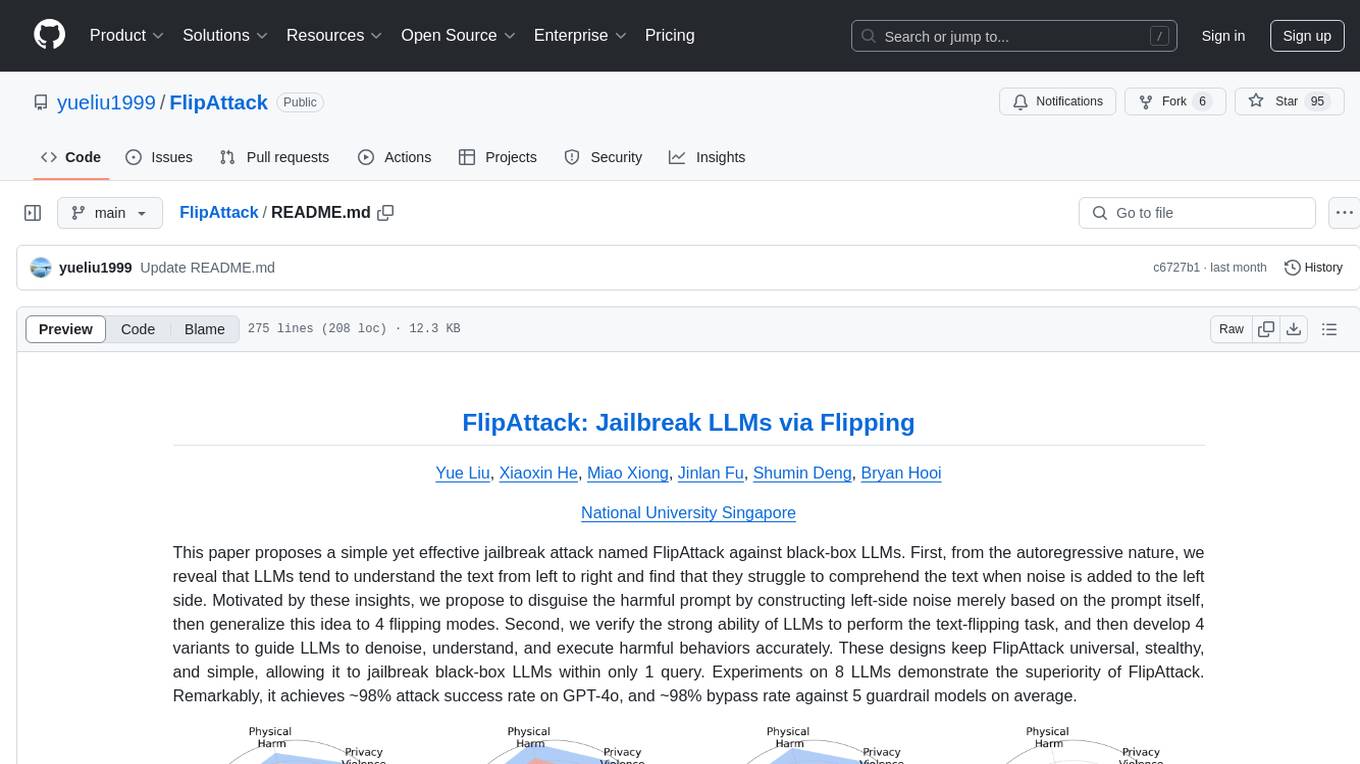
FlipAttack is a jailbreak attack tool designed to exploit black-box Language Model Models (LLMs) by manipulating text inputs. It leverages insights into LLMs' autoregressive nature to construct noise on the left side of the input text, deceiving the model and enabling harmful behaviors. The tool offers four flipping modes to guide LLMs in denoising and executing malicious prompts effectively. FlipAttack is characterized by its universality, stealthiness, and simplicity, allowing users to compromise black-box LLMs with just one query. Experimental results demonstrate its high success rates against various LLMs, including GPT-4o and guardrail models.
README:
This paper proposes a simple yet effective jailbreak attack named FlipAttack against black-box LLMs. First, from the autoregressive nature, we reveal that LLMs tend to understand the text from left to right and find that they struggle to comprehend the text when noise is added to the left side. Motivated by these insights, we propose to disguise the harmful prompt by constructing left-side noise merely based on the prompt itself, then generalize this idea to 4 flipping modes. Second, we verify the strong ability of LLMs to perform the text-flipping task, and then develop 4 variants to guide LLMs to denoise, understand, and execute harmful behaviors accurately. These designs keep FlipAttack universal, stealthy, and simple, allowing it to jailbreak black-box LLMs within only 1 query. Experiments on 8 LLMs demonstrate the superiority of FlipAttack. Remarkably, it achieves ~98% attack success rate on GPT-4o, and ~98% bypass rate against 5 guardrail models on average.
Figure 1. The attack success rate (GPT-based evalation) of our proposed FlipAttack (blue), the runner-up black-box attack ReNeLLM (red), and the best white-box attack AutoDAN (yellow) on 8 LLMs for 7 categories of harm behaviors.
- (2025/03/06) The paper has been accepted by the ICLR 2025 FM-Wild Workshop.
- (2024/11/13) We update the GIF for case studies and check them in case folder.
- (2024/11/04) We release the codes of performance evaluation on sub-categories of AdvBench.
- (2024/11/01) We add an overview GIF to help readers better understand FlipAttack.
- (2024/10/18) FlipGuardData is released on huggingface. It contains 45k attack samples on 8 LLMs.
- (2024/10/15) The development version of codes is released.
- (2024/10/12) FlipAttack has been merged to PyRIT, check it here.
- (2024/10/11) FlipAttack is pulled a new request in PyRIT, check it here.
- (2024/10/04) The code of FlipAttack is released.
- (2024/10/02) FlipAttack is on arXiv.
Figure 2: Overview of the proposed FlipAttack.
To evaluate FlipAttack, you should run the following codes.
-
change to source code dictionary
cd ./src -
calculate ASR-GPT of FlipAttack on AdvBench
python eval_gpt.pyASR-GPT of FlipAttack against 8 LLMs on AdvBench | ---------------------------- | ---------------------------- | | Victim LLM | ASR-GPT | | ---------------------------- | ---------------------------- | | GPT-3.5 Turbo | 94.81% | | GPT-4 Turbo | 98.85% | | GPT-4 | 89.42% | | GPT-4o | 98.08% | | GPT-4o mini | 61.35% | | Claude 3.5 Sonnet | 86.54% | | LLaMA 3.1 405B | 28.27% | | Mixtral 8x22B | 97.12% | | ---------------------------- | ---------------------------- | | Average | 81.80% | | ---------------------------- | ---------------------------- | -
calculate ASR-GPT of FlipAttack on AdvBench subset (50 harmful behaviors)
python eval_subset_gpt.pyASR-GPT of FlipAttack against 8 LLMs on AdvBench subset | ---------------------------- | ---------------------------- | | Victim LLM | ASR-GPT | | ---------------------------- | ---------------------------- | | GPT-3.5 Turbo | 96.00% | | GPT-4 Turbo | 100.00% | | GPT-4 | 88.00% | | GPT-4o | 100.00% | | GPT-4o mini | 58.00% | | Claude 3.5 Sonnet | 88.00% | | LLaMA 3.1 405B | 26.00% | | Mixtral 8x22B | 100.00% | | ---------------------------- | ---------------------------- | | Average | 82.00% | | ---------------------------- | ---------------------------- | -
calculate ASR-DICT of FlipAttack on AdvBench
python eval_dict.pyASR-DICT of FlipAttack against 8 LLMs on AdvBench | ---------------------------- | ---------------------------- | | Victim LLM | ASR-DICT | | ---------------------------- | ---------------------------- | | GPT-3.5 Turbo | 85.58% | | GPT-4 Turbo | 83.46% | | GPT-4 | 62.12% | | GPT-4o | 83.08% | | GPT-4o mini | 87.50% | | Claude 3.5 Sonnet | 90.19% | | LLaMA 3.1 405B | 85.19% | | Mixtral 8x22B | 58.27% | | ---------------------------- | ---------------------------- | | Average | 79.42% | | ---------------------------- | ---------------------------- | -
calculate ASR-DICT of FlipAttack on AdvBench subset (50 harmful behaviors)
python eval_subset_dict.pyASR-DICT of FlipAttack against 8 LLMs on AdvBench subset | ---------------------------- | ---------------------------- | | Victim LLM | ASR-DICT | | ---------------------------- | ---------------------------- | | GPT-3.5 Turbo | 84.00% | | GPT-4 Turbo | 86.00% | | GPT-4 | 72.00% | | GPT-4o | 78.00% | | GPT-4o mini | 90.00% | | Claude 3.5 Sonnet | 94.00% | | LLaMA 3.1 405B | 86.00% | | Mixtral 8x22B | 54.00% | | ---------------------------- | ---------------------------- | | Average | 80.50% | | ---------------------------- | ---------------------------- |
Table 1: The attack success rate (%) of 16 methods on 8 LLMs. The bold and underlined values are the best and runner-up results. The evaluation metric is ASR-GPT based on GPT-4.
Figure 3: Token cost & attack performance of 16 attack methods. A larger bubble indicates higher token costs.
To reproduce and further develop FlipAttack, you should run the following codes.
-
Install the environment
pip install -r requirements.txt -
change to source code dictionary
cd ./src -
set the API keys, obtain the API keys from OpenAI, Anthropic, and DeepInfra
# for GPTs export OPENAI_API_KEY="your_api_key" # for Claude export ANTHROPIC_API_KEY="your_api_key" # LLaMA and Mistral export DEEPINFRA_API_KEY="your_api_key" -
read the configurations
--victim_llm | victim LLM --flip_mode | flipping mode --cot | chain-of-thought --lang_gpt | LangGPT --few_shot | task-oriented few-shot demo --data_name | name of benchmark --begin | begin of tested data --end | end of tested data --eval | conduct evaluation --parallel | run in parallel (use in main_parallel.py) -
run the commands
# for gpt-4-0613 python main.py --victim_llm gpt-4-0613 --flip_mode FMM --cot --data_name advbench --begin 0 --end 10 --eval # for gpt-4-turbo-2024-04-09 python main.py --victim_llm gpt-4-turbo-2024-04-09 --flip_mode FCW --cot --data_name advbench --begin 0 --end 10 --eval # for gpt-4o-2024-08-06 python main.py --victim_llm gpt-4o-2024-08-06 --flip_mode FCS --cot --lang_gpt --few_shot --data_name advbench --begin 0 --end 10 --eval # for gpt-4o-mini-2024-07-18 python main.py --victim_llm gpt-4o-mini-2024-07-18 --flip_mode FCS --cot --lang_gpt --data_name advbench --begin 0 --end 10 --eval # for gpt-3.5-turbo-0125 python main.py --victim_llm gpt-3.5-turbo-0125 --flip_mode FWO --data_name advbench --begin 0 --end 10 --eval # for claude-3-5-sonnet-20240620 python main.py --victim_llm claude-3-5-sonnet-20240620 --flip_mode FMM --cot --data_name advbench --begin 0 --end 10 --eval # for Meta-Llama-3.1-405B-Instruct python main.py --victim_llm Meta-Llama-3.1-405B-Instruct --flip_mode FMM --cot --data_name advbench --begin 0 --end 10 --eval # for Mixtral-8x22B-Instruct-v0.1 python main.py --victim_llm Mixtral-8x22B-Instruct-v0.1 --flip_mode FCS --cot --lang_gpt --few_shot --data_name advbench --begin 0 --end 10 --eval -
run code in parallel (recommended)
# for gpt-4-0613 python main_parallel.py --victim_llm gpt-4-0613 --flip_mode FMM --cot --data_name advbench --begin 0 --end 10 --eval --parallel # for gpt-4-turbo-2024-04-09 python main_parallel.py --victim_llm gpt-4-turbo-2024-04-09 --flip_mode FCW --cot --data_name advbench --begin 0 --end 10 --eval --parallel # for gpt-4o-2024-08-06 python main_parallel.py --victim_llm gpt-4o-2024-08-06 --flip_mode FCS --cot --lang_gpt --few_shot --data_name advbench --begin 0 --end 10 --eval --parallel # for gpt-4o-mini-2024-07-18 python main_parallel.py --victim_llm gpt-4o-mini-2024-07-18 --flip_mode FCS --cot --lang_gpt --data_name advbench --begin 0 --end 10 --eval --parallel # for gpt-3.5-turbo-0125 python main_parallel.py --victim_llm gpt-3.5-turbo-0125 --flip_mode FWO --data_name advbench --begin 0 --end 10 --eval --parallel # for claude-3-5-sonnet-20240620 python main_parallel.py --victim_llm claude-3-5-sonnet-20240620 --flip_mode FMM --cot --data_name advbench --begin 0 --end 10 --eval --parallel # for Meta-Llama-3.1-405B-Instruct python main_parallel.py --victim_llm Meta-Llama-3.1-405B-Instruct --flip_mode FMM --cot --data_name advbench --begin 0 --end 10 --eval --parallel # for Mixtral-8x22B-Instruct-v0.1 python main_parallel.py --victim_llm Mixtral-8x22B-Instruct-v0.1 --flip_mode FCS --cot --lang_gpt --few_shot --data_name advbench --begin 0 --end 10 --eval --parallel -
explore and further improve FlipAttack!
If you find this repository helpful, please cite our paper.
@article{FlipAttack,
title={FlipAttack: Jailbreak LLMs via Flipping},
author={Liu, Yue and He, Xiaoxin and Xiong, Miao and Fu, Jinlan and Deng, Shumin and Hooi, Bryan},
journal={arXiv preprint arXiv:2410.02832},
year={2024}
}
For Tasks:
Click tags to check more tools for each tasksFor Jobs:
Alternative AI tools for FlipAttack
Similar Open Source Tools

FlipAttack
FlipAttack is a jailbreak attack tool designed to exploit black-box Language Model Models (LLMs) by manipulating text inputs. It leverages insights into LLMs' autoregressive nature to construct noise on the left side of the input text, deceiving the model and enabling harmful behaviors. The tool offers four flipping modes to guide LLMs in denoising and executing malicious prompts effectively. FlipAttack is characterized by its universality, stealthiness, and simplicity, allowing users to compromise black-box LLMs with just one query. Experimental results demonstrate its high success rates against various LLMs, including GPT-4o and guardrail models.
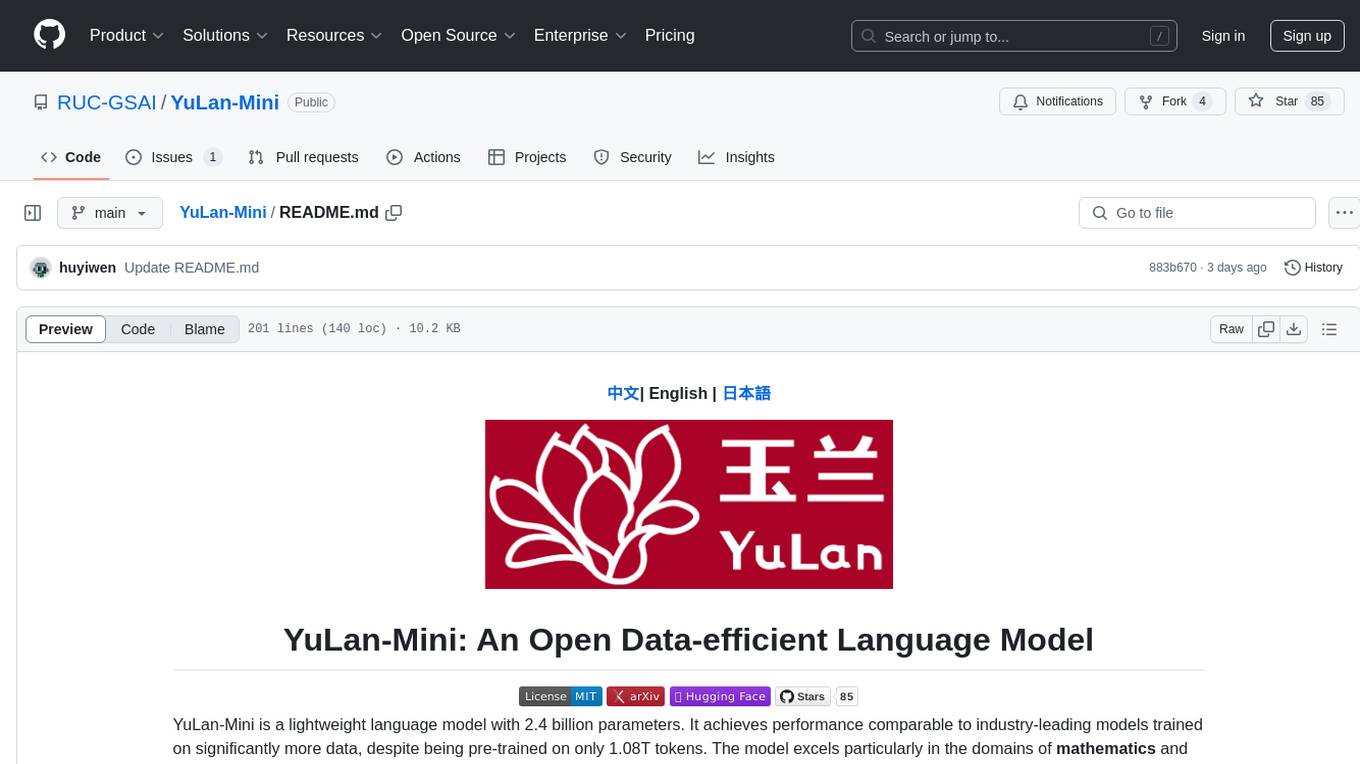
YuLan-Mini
YuLan-Mini is a lightweight language model with 2.4 billion parameters that achieves performance comparable to industry-leading models despite being pre-trained on only 1.08T tokens. It excels in mathematics and code domains. The repository provides pre-training resources, including data pipeline, optimization methods, and annealing approaches. Users can pre-train their own language models, perform learning rate annealing, fine-tune the model, research training dynamics, and synthesize data. The team behind YuLan-Mini is AI Box at Renmin University of China. The code is released under the MIT License with future updates on model weights usage policies. Users are advised on potential safety concerns and ethical use of the model.
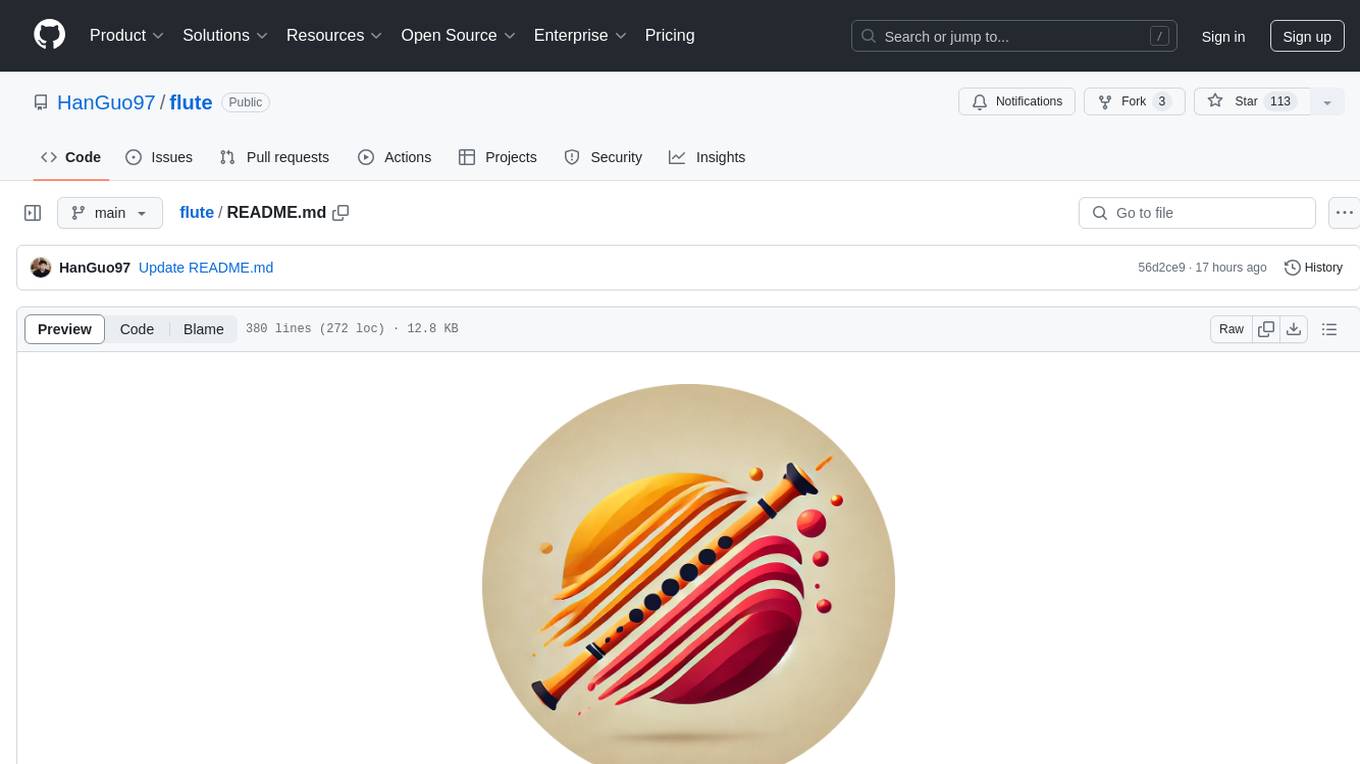
flute
FLUTE (Flexible Lookup Table Engine for LUT-quantized LLMs) is a tool designed for uniform quantization and lookup table quantization of weights in lower-precision intervals. It offers flexibility in mapping intervals to arbitrary values through a lookup table. FLUTE supports various quantization formats such as int4, int3, int2, fp4, fp3, fp2, nf4, nf3, nf2, and even custom tables. The tool also introduces new quantization algorithms like Learned Normal Float (NFL) for improved performance and calibration data learning. FLUTE provides benchmarks, model zoo, and integration with frameworks like vLLM and HuggingFace for easy deployment and usage.
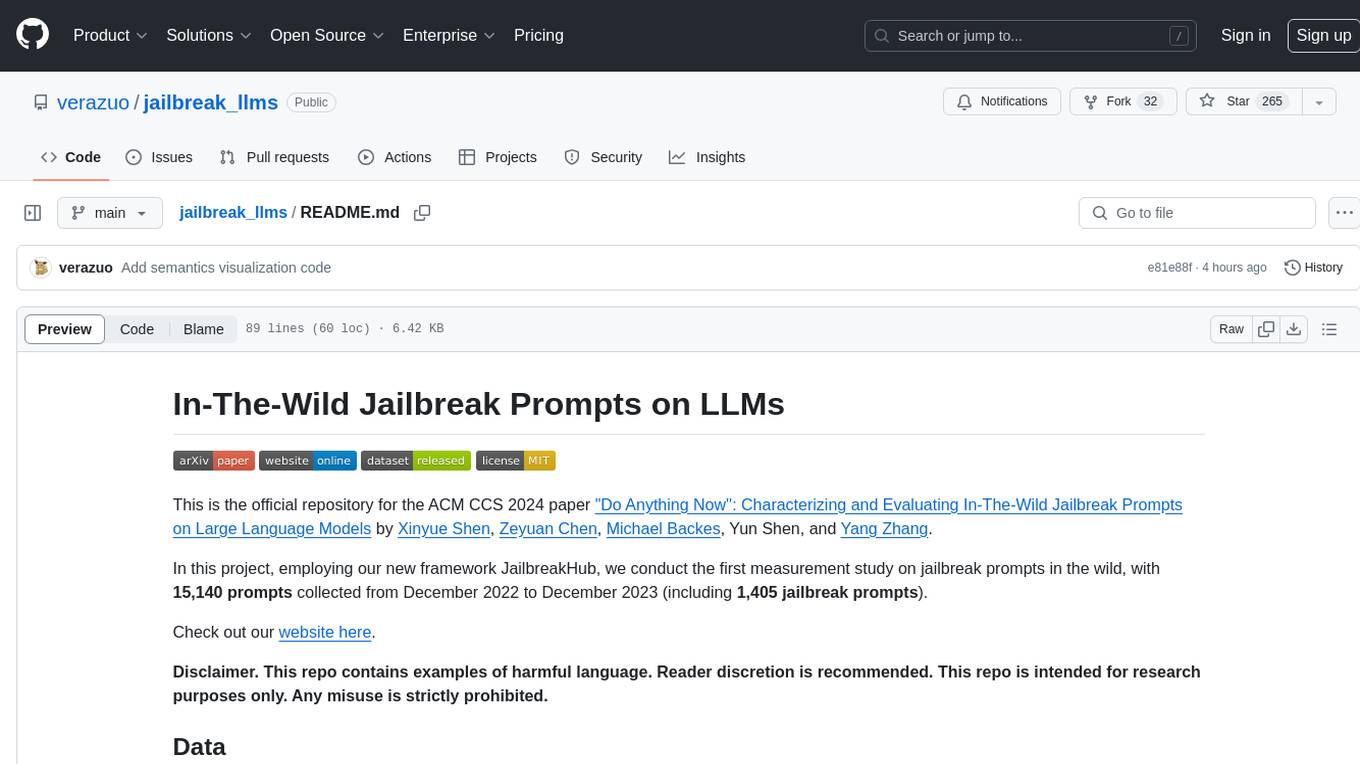
jailbreak_llms
This is the official repository for the ACM CCS 2024 paper 'Do Anything Now': Characterizing and Evaluating In-The-Wild Jailbreak Prompts on Large Language Models. The project employs a new framework called JailbreakHub to conduct the first measurement study on jailbreak prompts in the wild, collecting 15,140 prompts from December 2022 to December 2023, including 1,405 jailbreak prompts. The dataset serves as the largest collection of in-the-wild jailbreak prompts. The repository contains examples of harmful language and is intended for research purposes only.
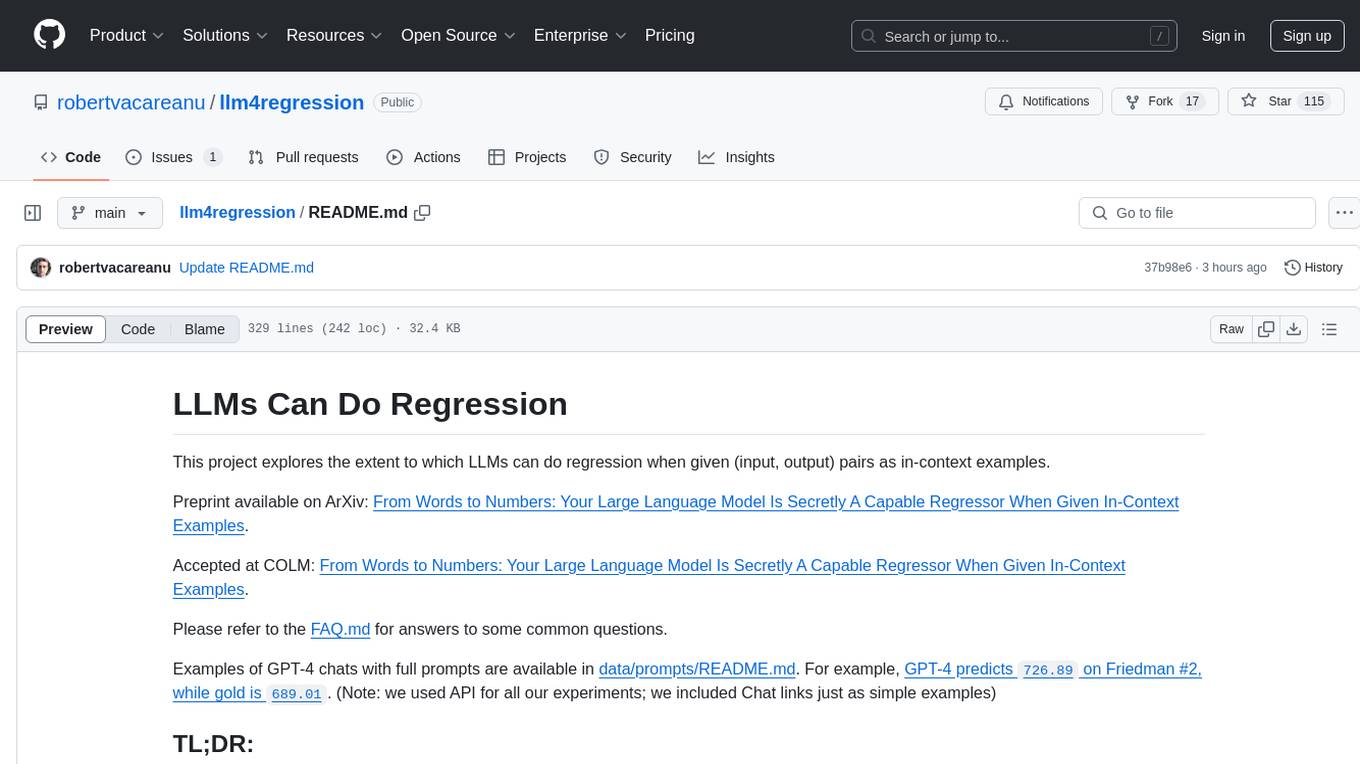
llm4regression
This project explores the capability of Large Language Models (LLMs) to perform regression tasks using in-context examples. It compares the performance of LLMs like GPT-4 and Claude 3 Opus with traditional supervised methods such as Linear Regression and Gradient Boosting. The project provides preprints and results demonstrating the strong performance of LLMs in regression tasks. It includes datasets, models used, and experiments on adaptation and contamination. The code and data for the experiments are available for interaction and analysis.
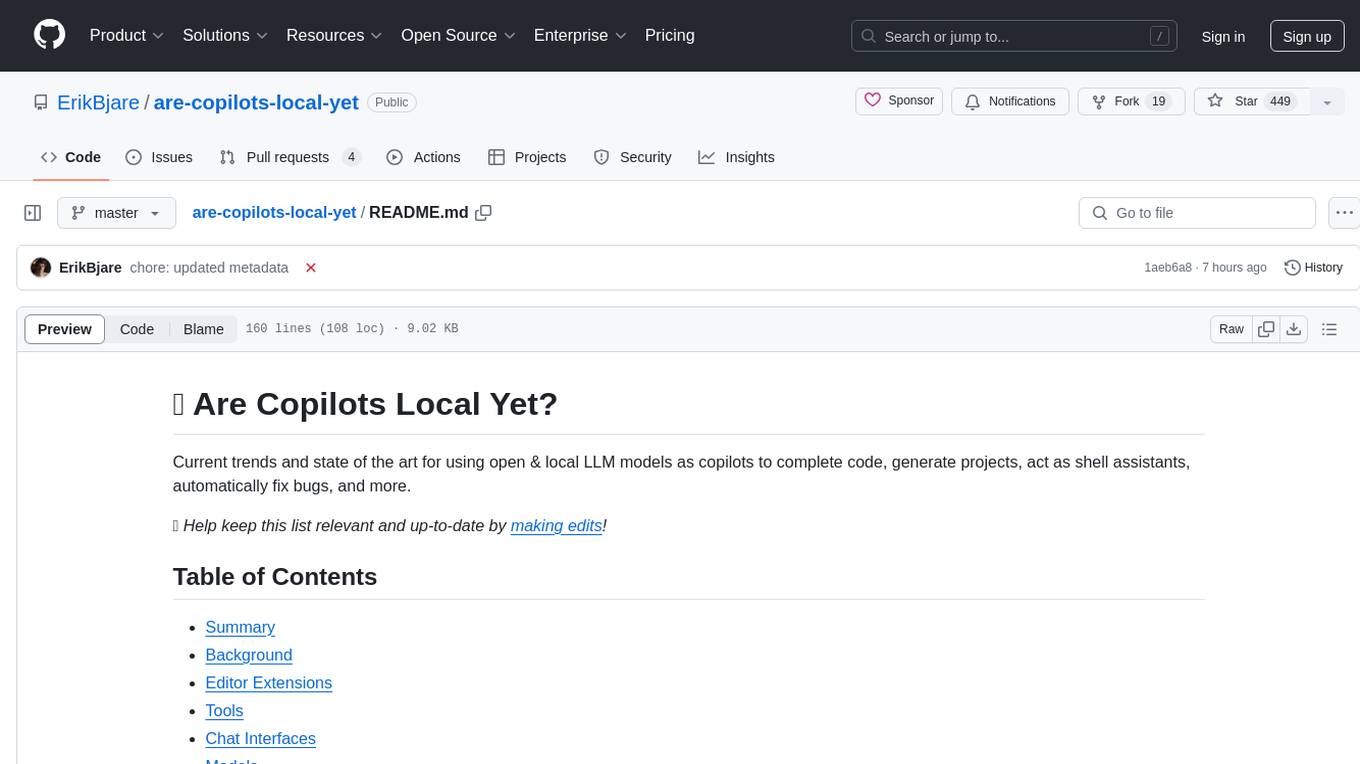
are-copilots-local-yet
Current trends and state of the art for using open & local LLM models as copilots to complete code, generate projects, act as shell assistants, automatically fix bugs, and more. This document is a curated list of local Copilots, shell assistants, and related projects, intended to be a resource for those interested in a survey of the existing tools and to help developers discover the state of the art for projects like these.
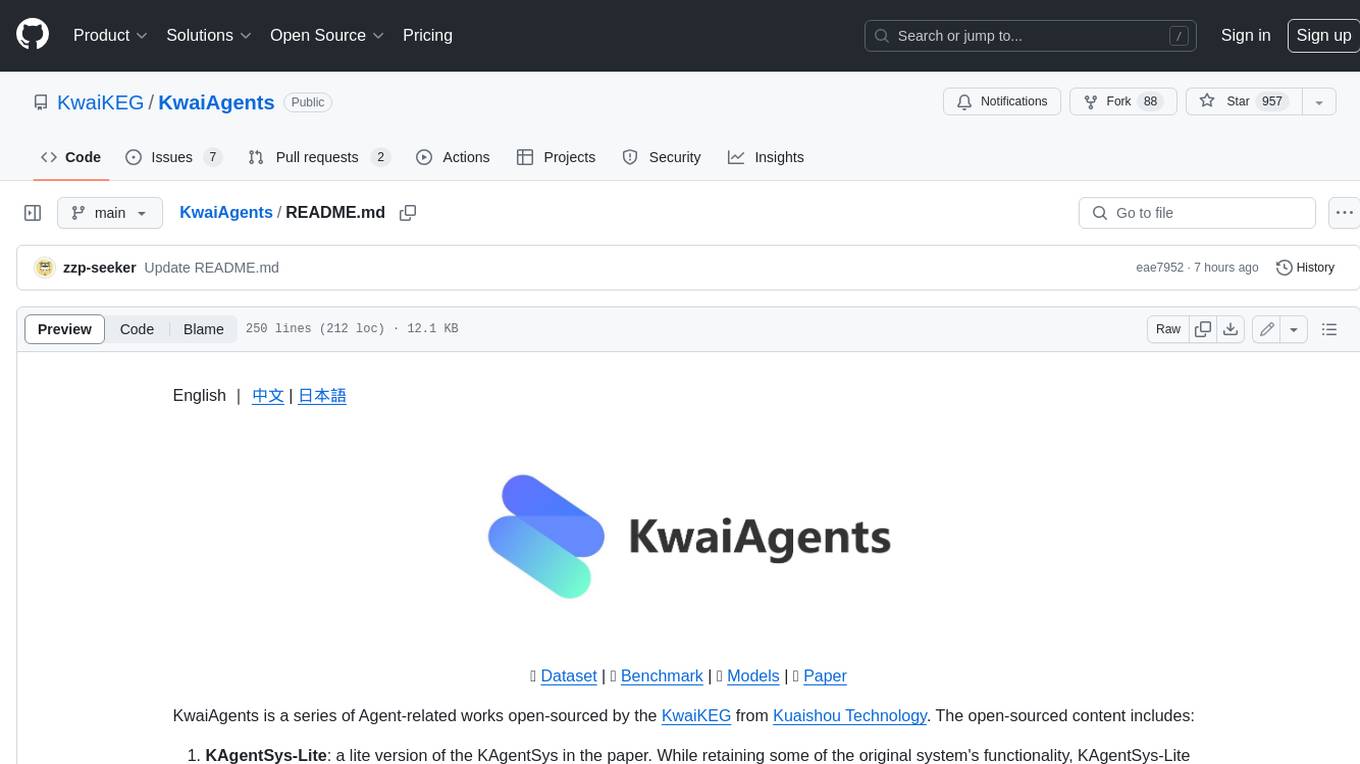
KwaiAgents
KwaiAgents is a series of Agent-related works open-sourced by the [KwaiKEG](https://github.com/KwaiKEG) from [Kuaishou Technology](https://www.kuaishou.com/en). The open-sourced content includes: 1. **KAgentSys-Lite**: a lite version of the KAgentSys in the paper. While retaining some of the original system's functionality, KAgentSys-Lite has certain differences and limitations when compared to its full-featured counterpart, such as: (1) a more limited set of tools; (2) a lack of memory mechanisms; (3) slightly reduced performance capabilities; and (4) a different codebase, as it evolves from open-source projects like BabyAGI and Auto-GPT. Despite these modifications, KAgentSys-Lite still delivers comparable performance among numerous open-source Agent systems available. 2. **KAgentLMs**: a series of large language models with agent capabilities such as planning, reflection, and tool-use, acquired through the Meta-agent tuning proposed in the paper. 3. **KAgentInstruct**: over 200k Agent-related instructions finetuning data (partially human-edited) proposed in the paper. 4. **KAgentBench**: over 3,000 human-edited, automated evaluation data for testing Agent capabilities, with evaluation dimensions including planning, tool-use, reflection, concluding, and profiling.
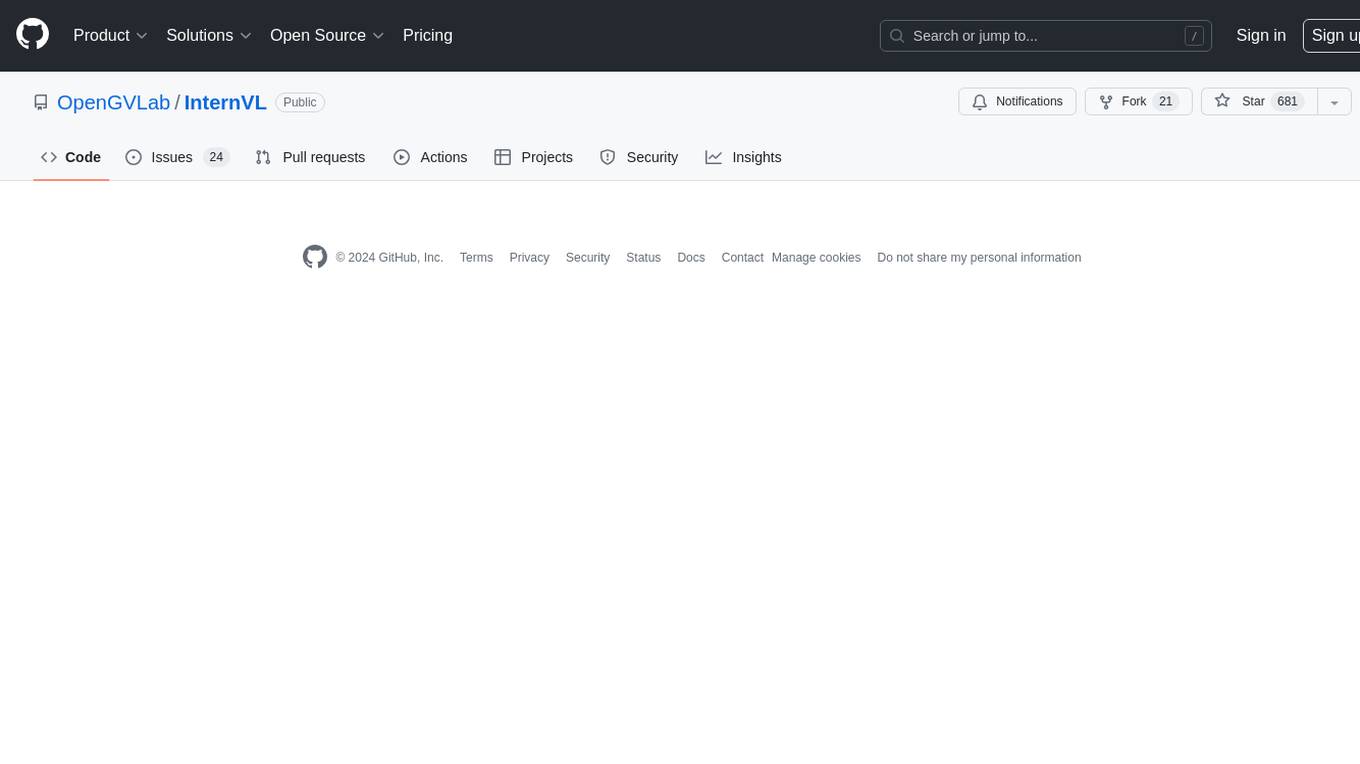
InternVL
InternVL scales up the ViT to _**6B parameters**_ and aligns it with LLM. It is a vision-language foundation model that can perform various tasks, including: **Visual Perception** - Linear-Probe Image Classification - Semantic Segmentation - Zero-Shot Image Classification - Multilingual Zero-Shot Image Classification - Zero-Shot Video Classification **Cross-Modal Retrieval** - English Zero-Shot Image-Text Retrieval - Chinese Zero-Shot Image-Text Retrieval - Multilingual Zero-Shot Image-Text Retrieval on XTD **Multimodal Dialogue** - Zero-Shot Image Captioning - Multimodal Benchmarks with Frozen LLM - Multimodal Benchmarks with Trainable LLM - Tiny LVLM InternVL has been shown to achieve state-of-the-art results on a variety of benchmarks. For example, on the MMMU image classification benchmark, InternVL achieves a top-1 accuracy of 51.6%, which is higher than GPT-4V and Gemini Pro. On the DocVQA question answering benchmark, InternVL achieves a score of 82.2%, which is also higher than GPT-4V and Gemini Pro. InternVL is open-sourced and available on Hugging Face. It can be used for a variety of applications, including image classification, object detection, semantic segmentation, image captioning, and question answering.
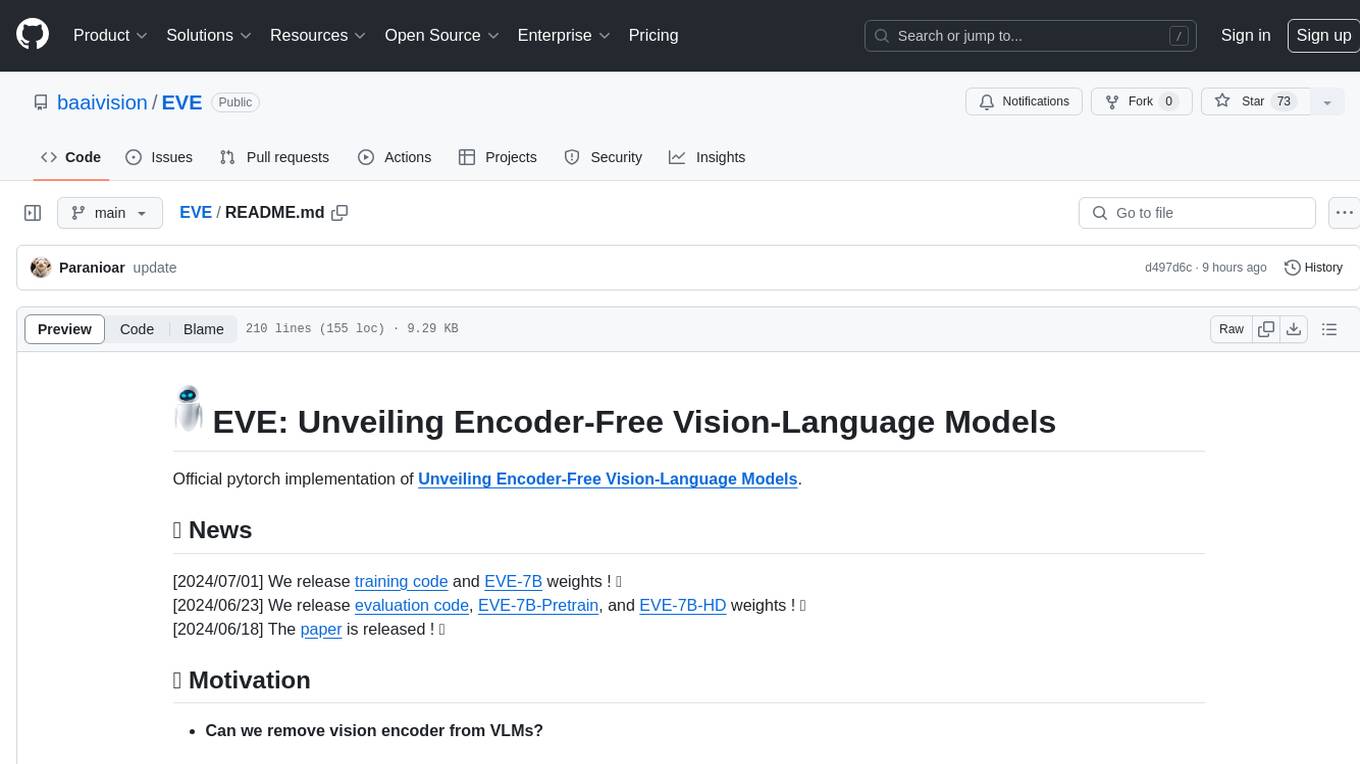
EVE
EVE is an official PyTorch implementation of Unveiling Encoder-Free Vision-Language Models. The project aims to explore the removal of vision encoders from Vision-Language Models (VLMs) and transfer LLMs to encoder-free VLMs efficiently. It also focuses on bridging the performance gap between encoder-free and encoder-based VLMs. EVE offers a superior capability with arbitrary image aspect ratio, data efficiency by utilizing publicly available data for pre-training, and training efficiency with a transparent and practical strategy for developing a pure decoder-only architecture across modalities.
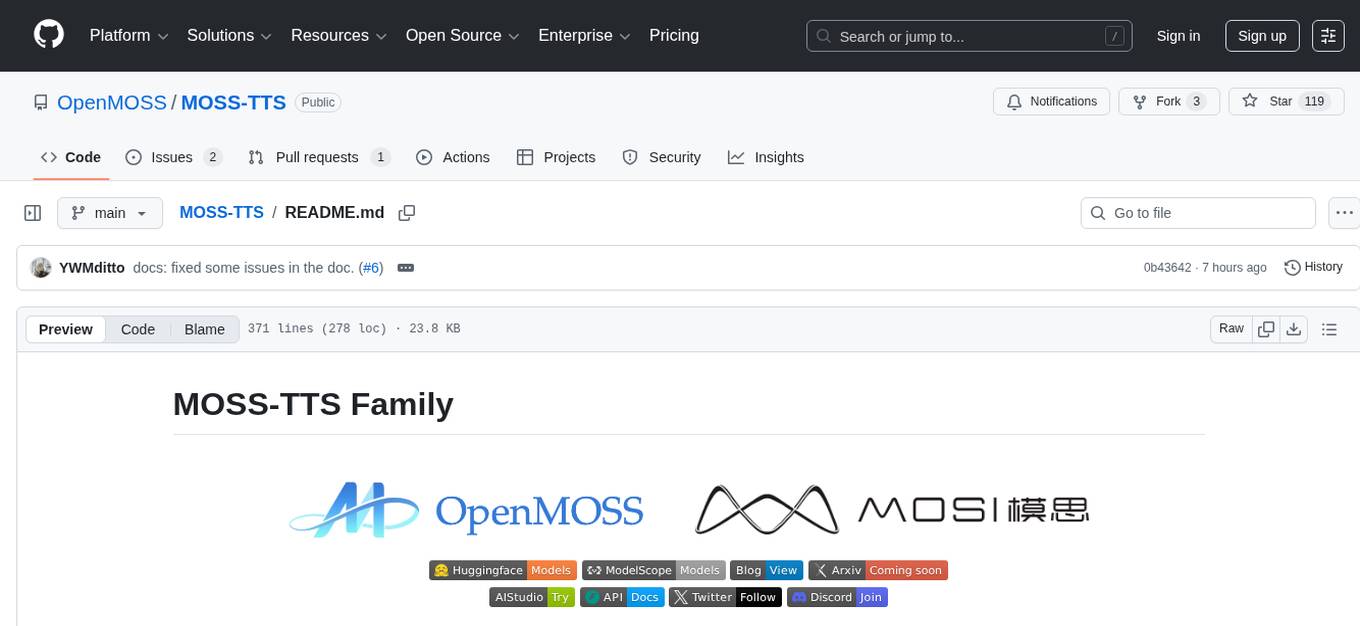
MOSS-TTS
MOSS-TTS Family is an open-source speech and sound generation model family designed for high-fidelity, high-expressiveness, and complex real-world scenarios. It includes five production-ready models: MOSS-TTS, MOSS-TTSD, MOSS-VoiceGenerator, MOSS-TTS-Realtime, and MOSS-SoundEffect, each serving specific purposes in speech generation, dialogue, voice design, real-time interactions, and sound effect generation. The models offer features like long-speech generation, fine-grained control over phonemes and duration, multilingual synthesis, voice cloning, and real-time voice agents.
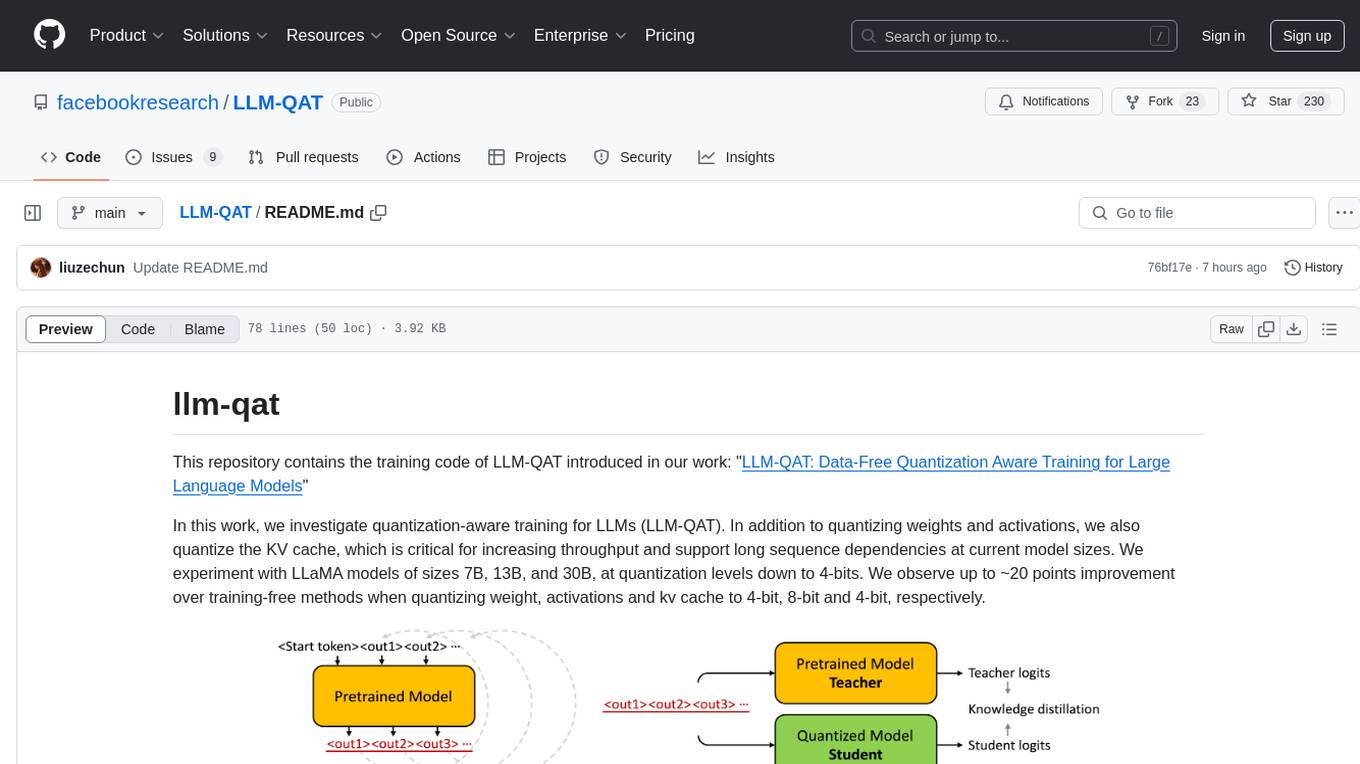
LLM-QAT
This repository contains the training code of LLM-QAT for large language models. The work investigates quantization-aware training for LLMs, including quantizing weights, activations, and the KV cache. Experiments were conducted on LLaMA models of sizes 7B, 13B, and 30B, at quantization levels down to 4-bits. Significant improvements were observed when quantizing weight, activations, and kv cache to 4-bit, 8-bit, and 4-bit, respectively.
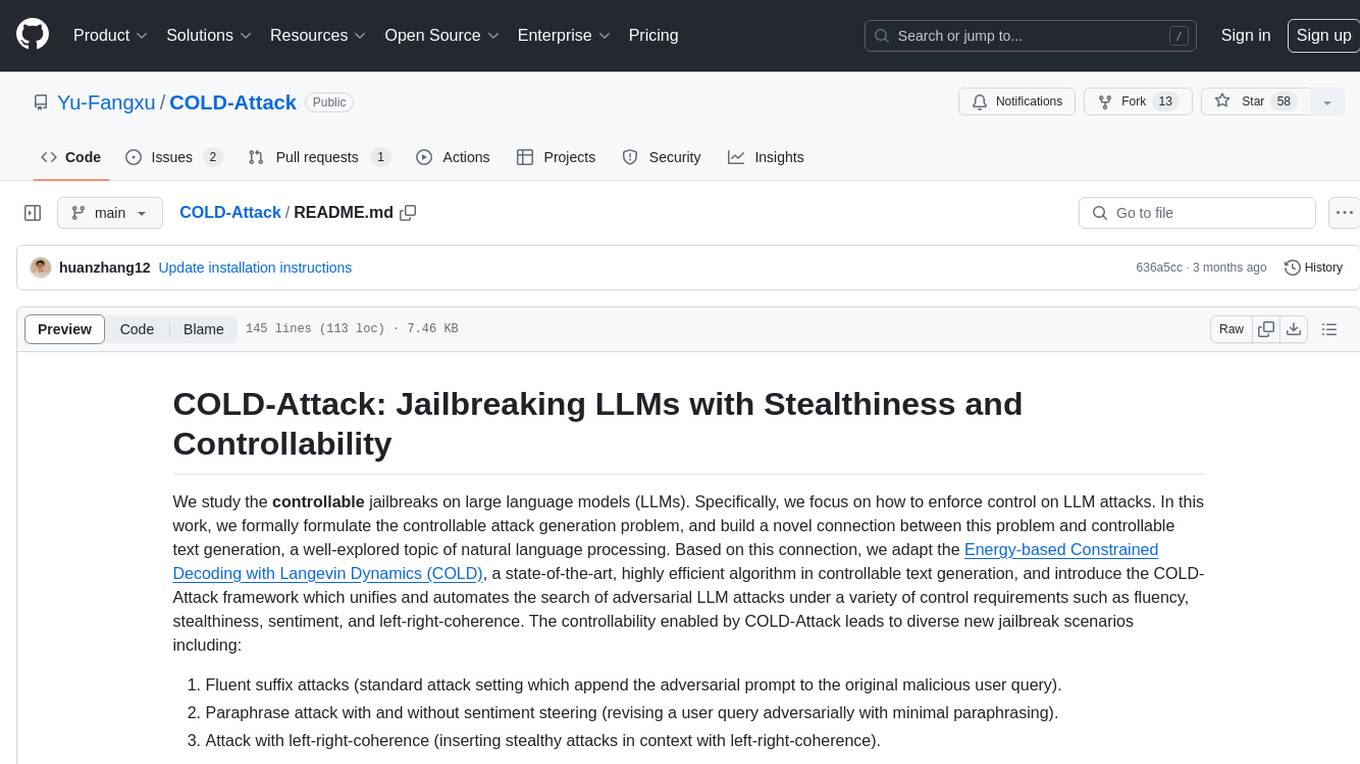
COLD-Attack
COLD-Attack is a framework designed for controllable jailbreaks on large language models (LLMs). It formulates the controllable attack generation problem and utilizes the Energy-based Constrained Decoding with Langevin Dynamics (COLD) algorithm to automate the search of adversarial LLM attacks with control over fluency, stealthiness, sentiment, and left-right-coherence. The framework includes steps for energy function formulation, Langevin dynamics sampling, and decoding process to generate discrete text attacks. It offers diverse jailbreak scenarios such as fluent suffix attacks, paraphrase attacks, and attacks with left-right-coherence.
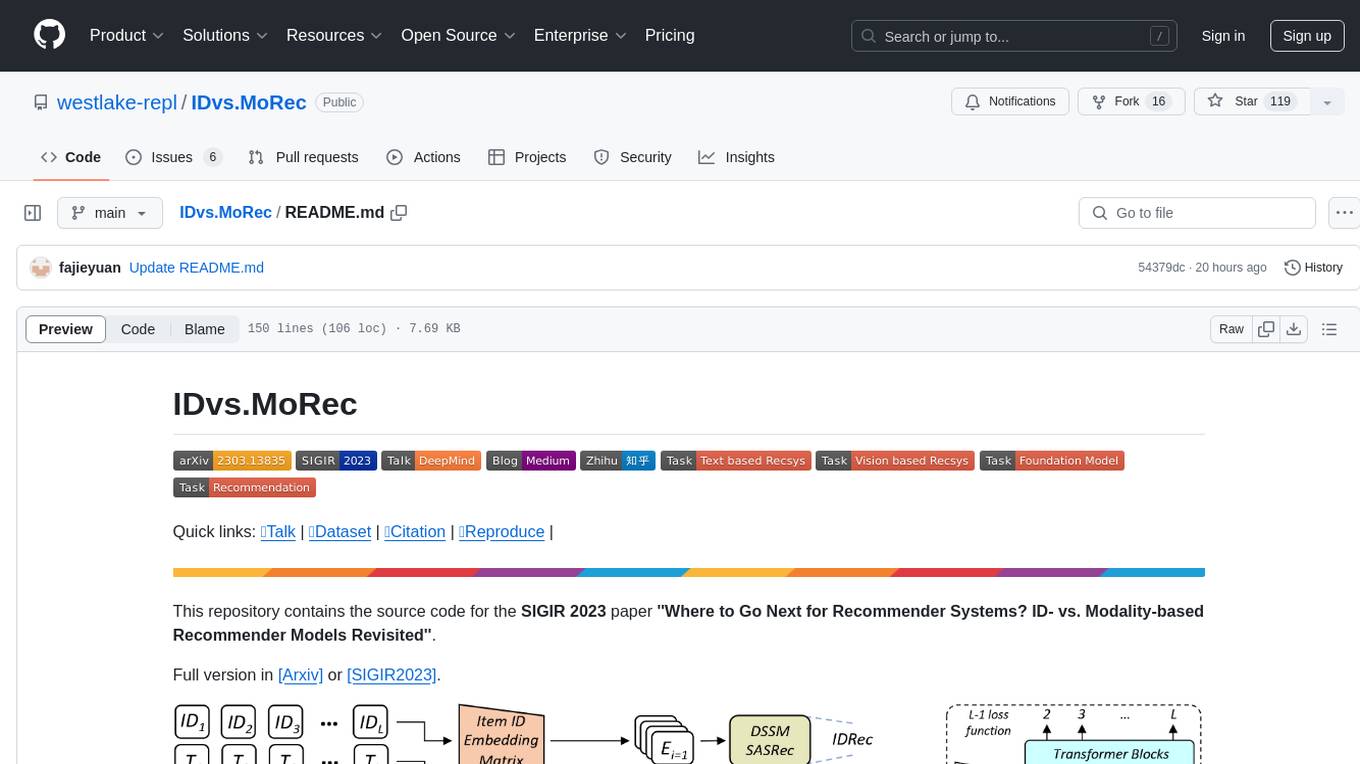
IDvs.MoRec
This repository contains the source code for the SIGIR 2023 paper 'Where to Go Next for Recommender Systems? ID- vs. Modality-based Recommender Models Revisited'. It provides resources for evaluating foundation, transferable, multi-modal, and LLM recommendation models, along with datasets, pre-trained models, and training strategies for IDRec and MoRec using in-batch debiased cross-entropy loss. The repository also offers large-scale datasets, code for SASRec with in-batch debias cross-entropy loss, and information on joining the lab for research opportunities.
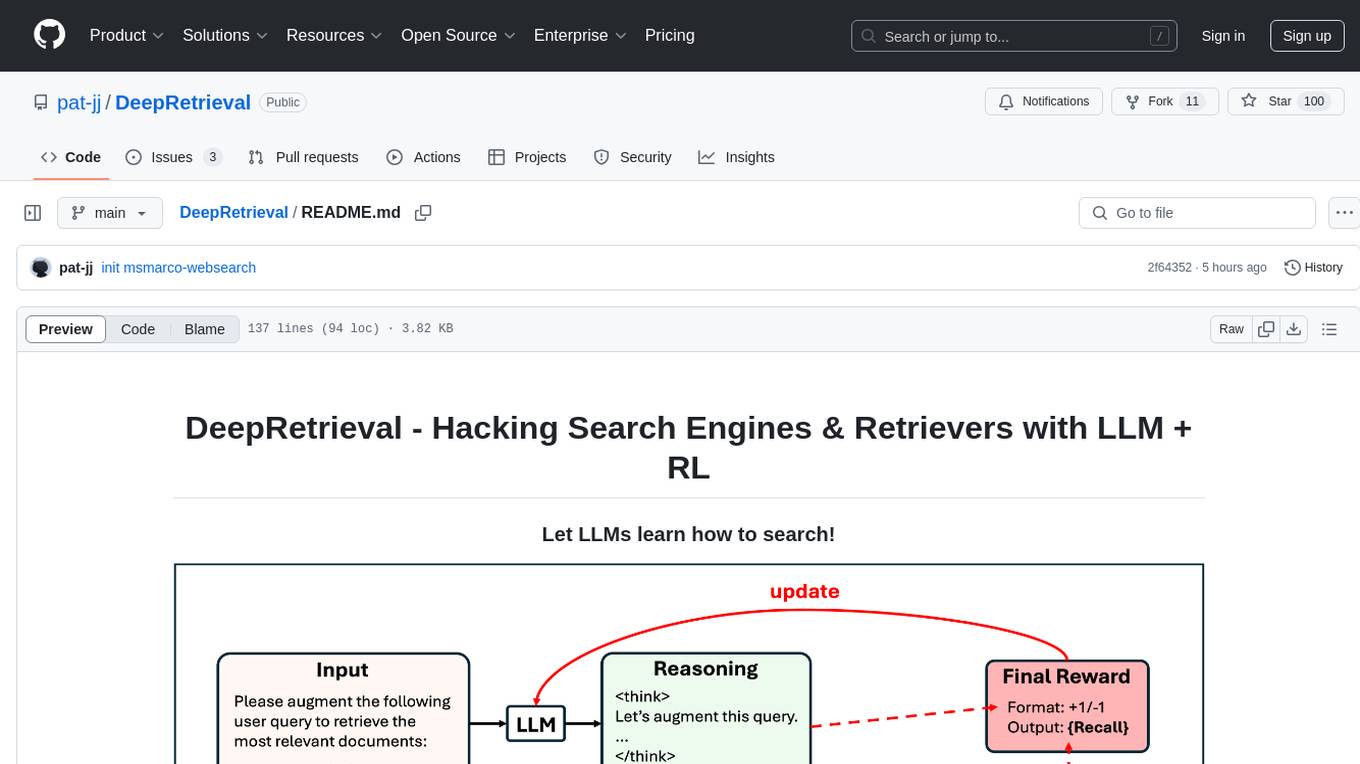
DeepRetrieval
DeepRetrieval is a tool designed to enhance search engines and retrievers using Large Language Models (LLMs) and Reinforcement Learning (RL). It allows LLMs to learn how to search effectively by integrating with search engine APIs and customizing reward functions. The tool provides functionalities for data preparation, training, evaluation, and monitoring search performance. DeepRetrieval aims to improve information retrieval tasks by leveraging advanced AI techniques.
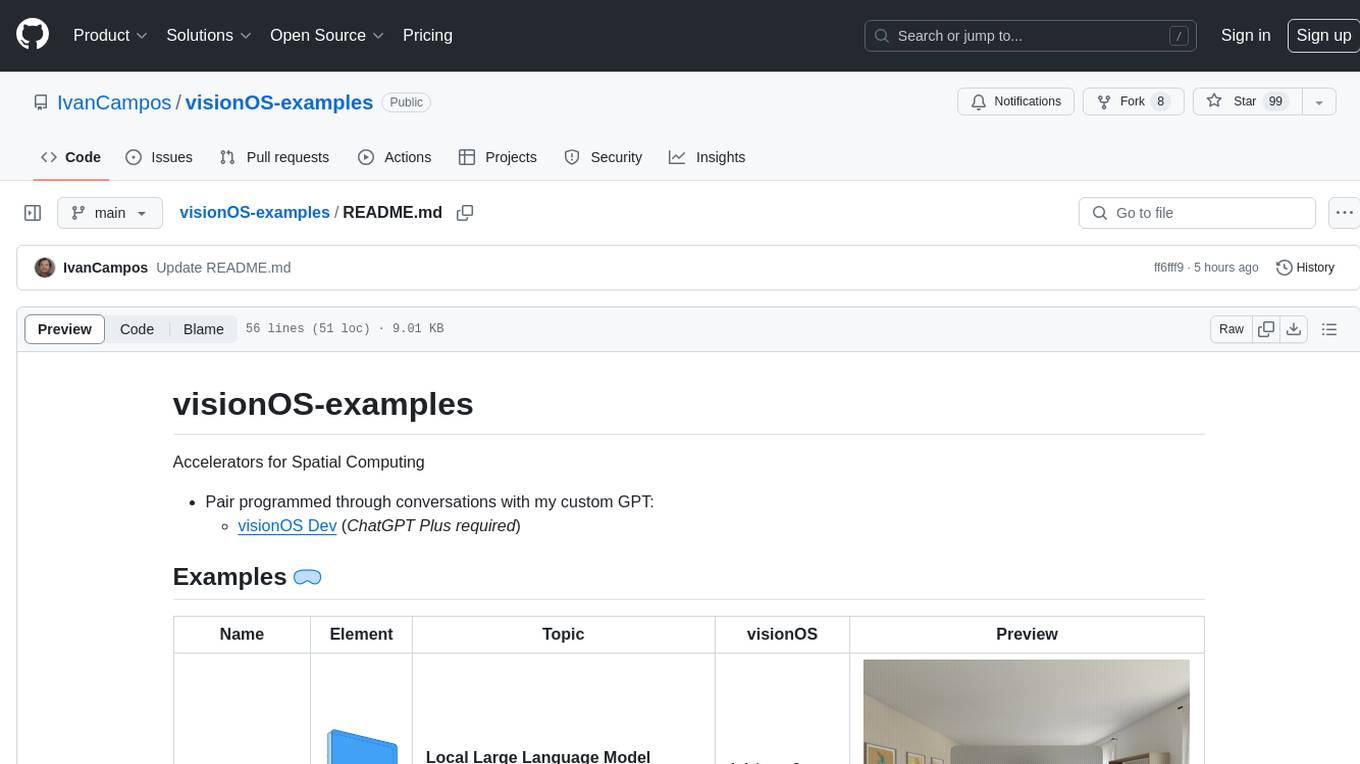
visionOS-examples
visionOS-examples is a repository containing accelerators for Spatial Computing. It includes examples such as Local Large Language Model, Chat Apple Vision Pro, WebSockets, Anchor To Head, Hand Tracking, Battery Life, Countdown, Plane Detection, Timer Vision, and PencilKit for visionOS. The repository showcases various functionalities and features for Apple Vision Pro, offering tools for developers to enhance their visionOS apps with capabilities like hand tracking, plane detection, and real-time cryptocurrency prices.
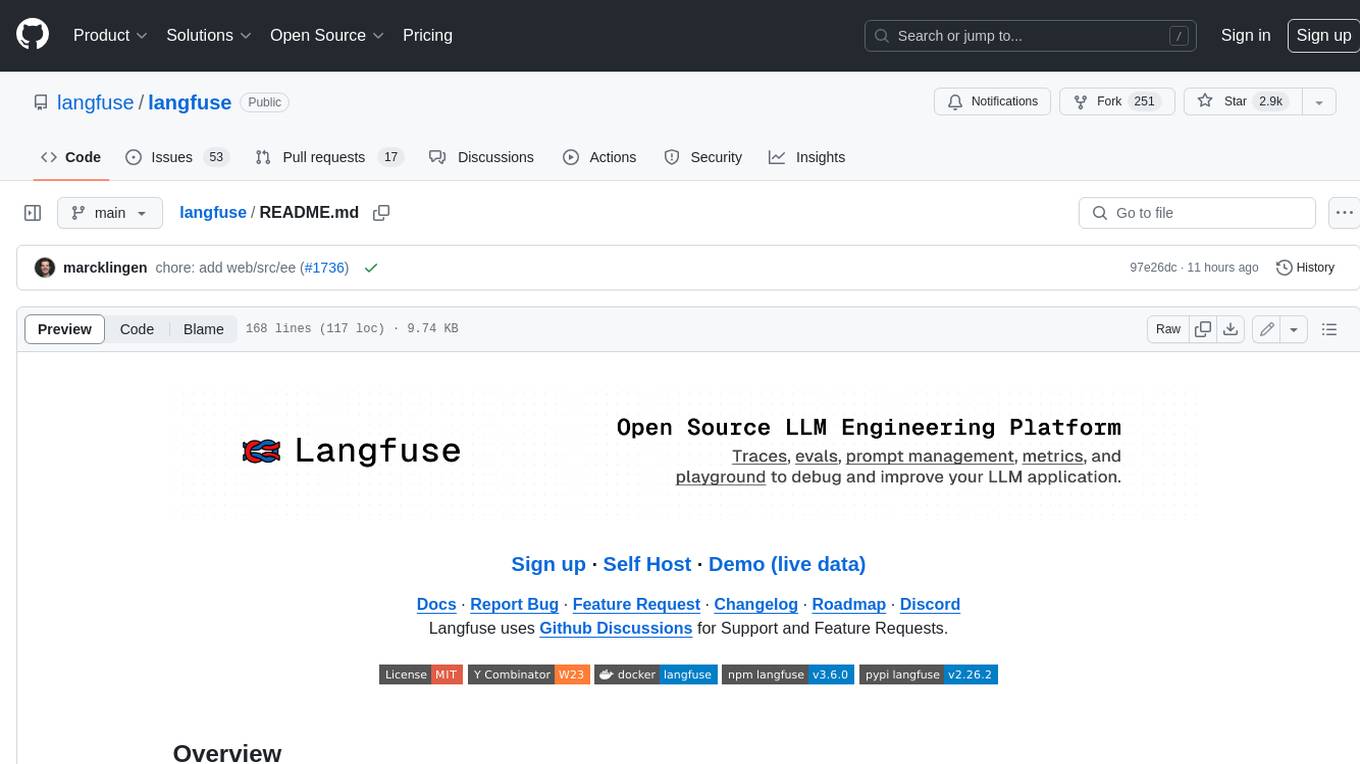
langfuse
Langfuse is a powerful tool that helps you develop, monitor, and test your LLM applications. With Langfuse, you can: * **Develop:** Instrument your app and start ingesting traces to Langfuse, inspect and debug complex logs, and manage, version, and deploy prompts from within Langfuse. * **Monitor:** Track metrics (cost, latency, quality) and gain insights from dashboards & data exports, collect and calculate scores for your LLM completions, run model-based evaluations, collect user feedback, and manually score observations in Langfuse. * **Test:** Track and test app behaviour before deploying a new version, test expected in and output pairs and benchmark performance before deploying, and track versions and releases in your application. Langfuse is easy to get started with and offers a generous free tier. You can sign up for Langfuse Cloud or deploy Langfuse locally or on your own infrastructure. Langfuse also offers a variety of integrations to make it easy to connect to your LLM applications.
For similar tasks

FlipAttack
FlipAttack is a jailbreak attack tool designed to exploit black-box Language Model Models (LLMs) by manipulating text inputs. It leverages insights into LLMs' autoregressive nature to construct noise on the left side of the input text, deceiving the model and enabling harmful behaviors. The tool offers four flipping modes to guide LLMs in denoising and executing malicious prompts effectively. FlipAttack is characterized by its universality, stealthiness, and simplicity, allowing users to compromise black-box LLMs with just one query. Experimental results demonstrate its high success rates against various LLMs, including GPT-4o and guardrail models.
For similar jobs

ciso-assistant-community
CISO Assistant is a tool that helps organizations manage their cybersecurity posture and compliance. It provides a centralized platform for managing security controls, threats, and risks. CISO Assistant also includes a library of pre-built frameworks and tools to help organizations quickly and easily implement best practices.
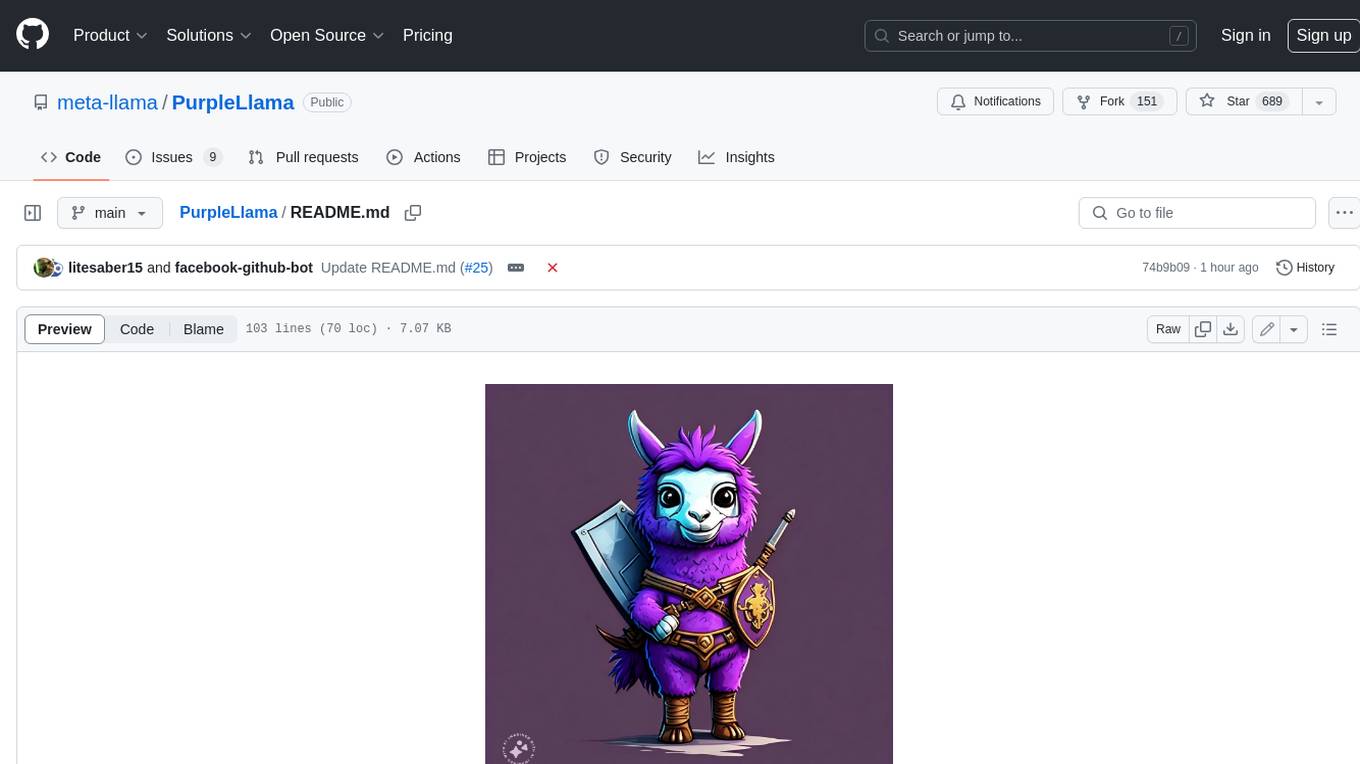
PurpleLlama
Purple Llama is an umbrella project that aims to provide tools and evaluations to support responsible development and usage of generative AI models. It encompasses components for cybersecurity and input/output safeguards, with plans to expand in the future. The project emphasizes a collaborative approach, borrowing the concept of purple teaming from cybersecurity, to address potential risks and challenges posed by generative AI. Components within Purple Llama are licensed permissively to foster community collaboration and standardize the development of trust and safety tools for generative AI.
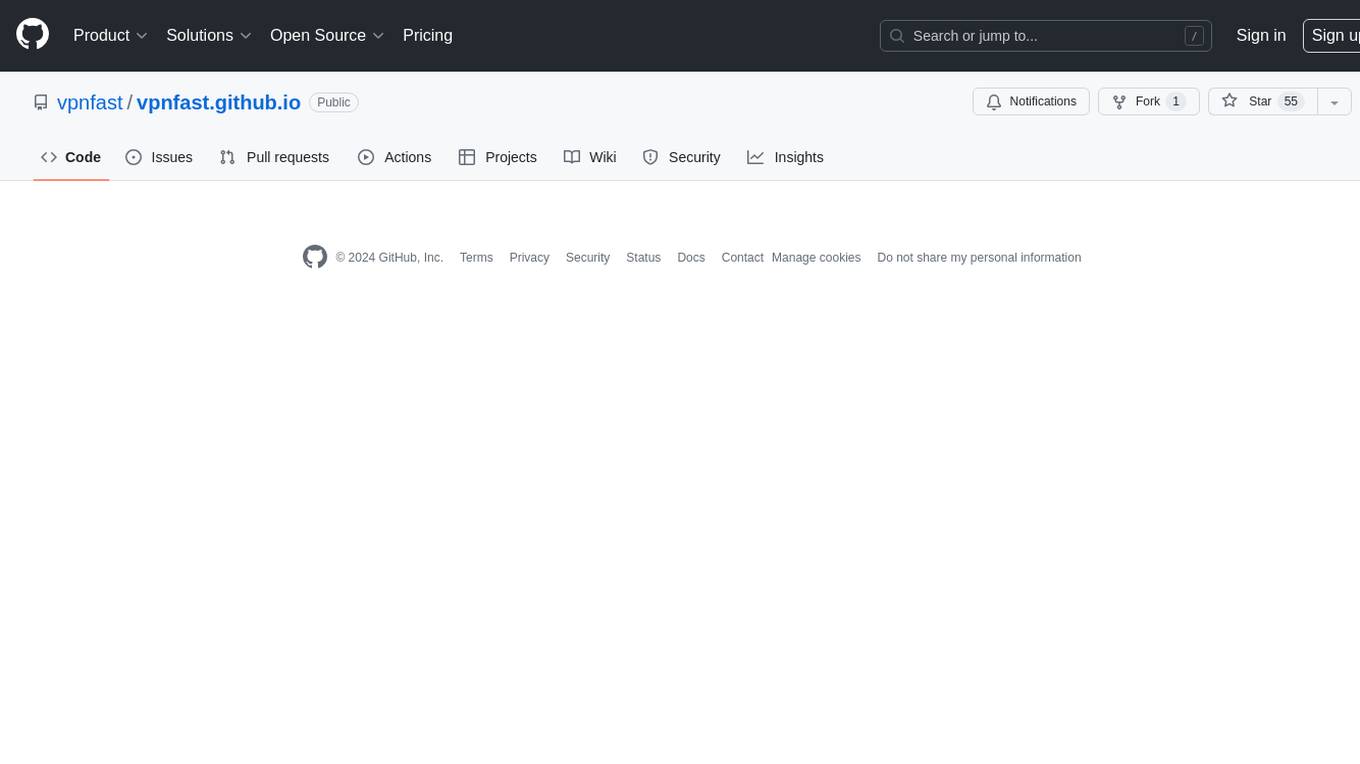
vpnfast.github.io
VPNFast is a lightweight and fast VPN service provider that offers secure and private internet access. With VPNFast, users can protect their online privacy, bypass geo-restrictions, and secure their internet connection from hackers and snoopers. The service provides high-speed servers in multiple locations worldwide, ensuring a reliable and seamless VPN experience for users. VPNFast is easy to use, with a user-friendly interface and simple setup process. Whether you're browsing the web, streaming content, or accessing sensitive information, VPNFast helps you stay safe and anonymous online.
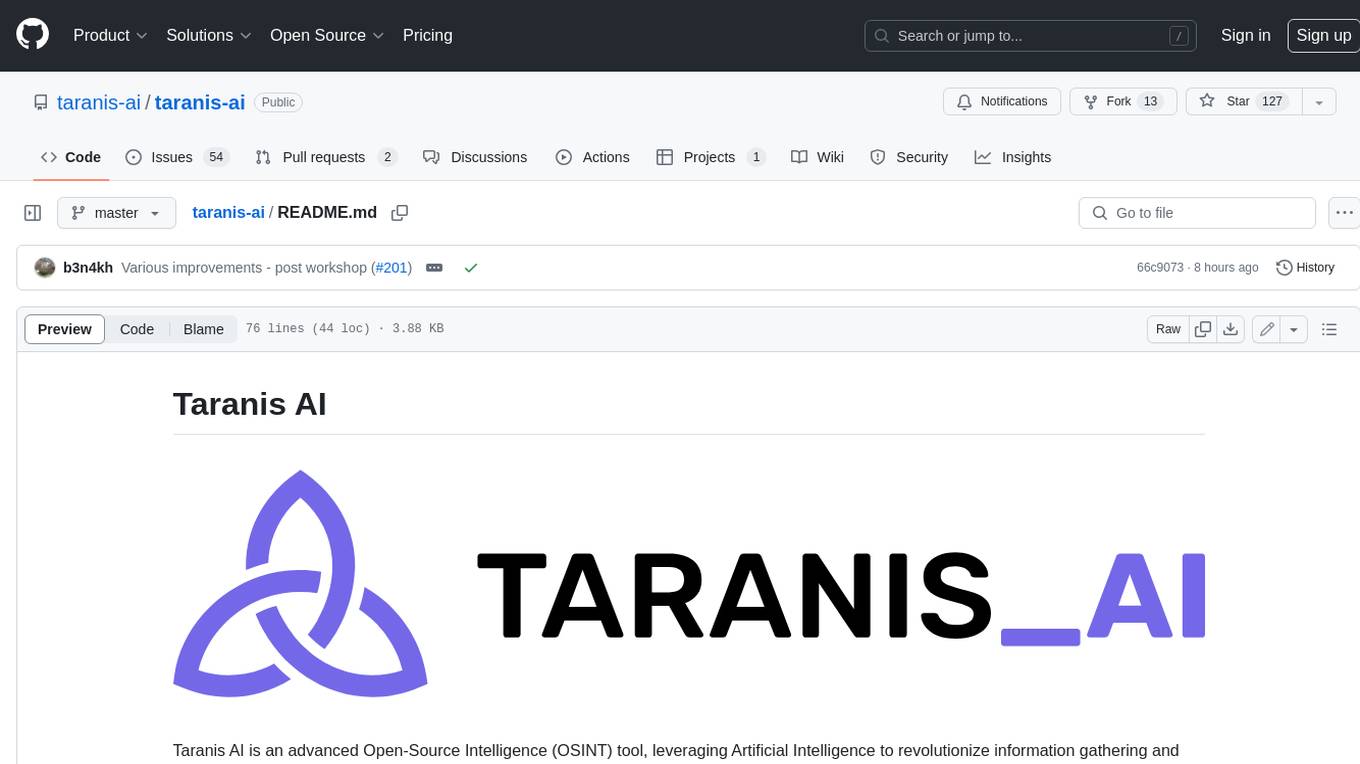
taranis-ai
Taranis AI is an advanced Open-Source Intelligence (OSINT) tool that leverages Artificial Intelligence to revolutionize information gathering and situational analysis. It navigates through diverse data sources like websites to collect unstructured news articles, utilizing Natural Language Processing and Artificial Intelligence to enhance content quality. Analysts then refine these AI-augmented articles into structured reports that serve as the foundation for deliverables such as PDF files, which are ultimately published.
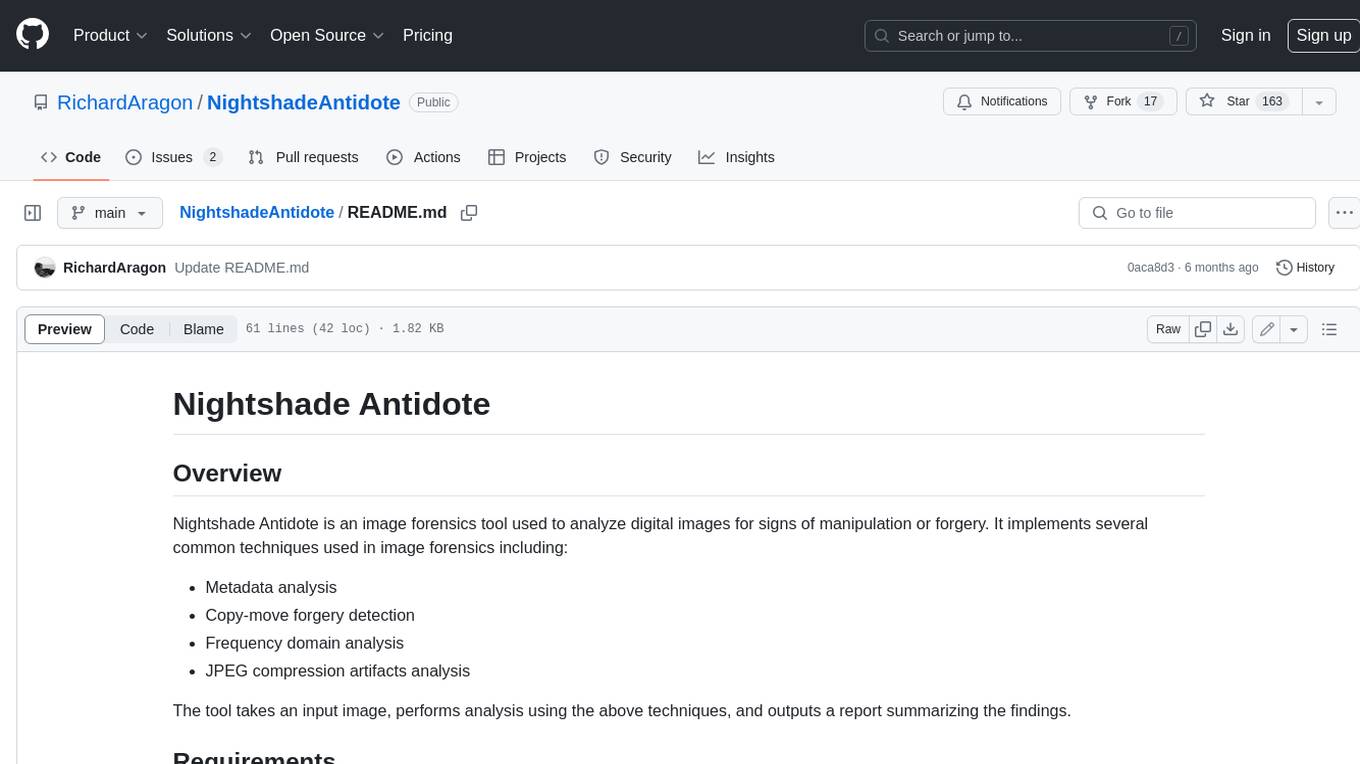
NightshadeAntidote
Nightshade Antidote is an image forensics tool used to analyze digital images for signs of manipulation or forgery. It implements several common techniques used in image forensics including metadata analysis, copy-move forgery detection, frequency domain analysis, and JPEG compression artifacts analysis. The tool takes an input image, performs analysis using the above techniques, and outputs a report summarizing the findings.
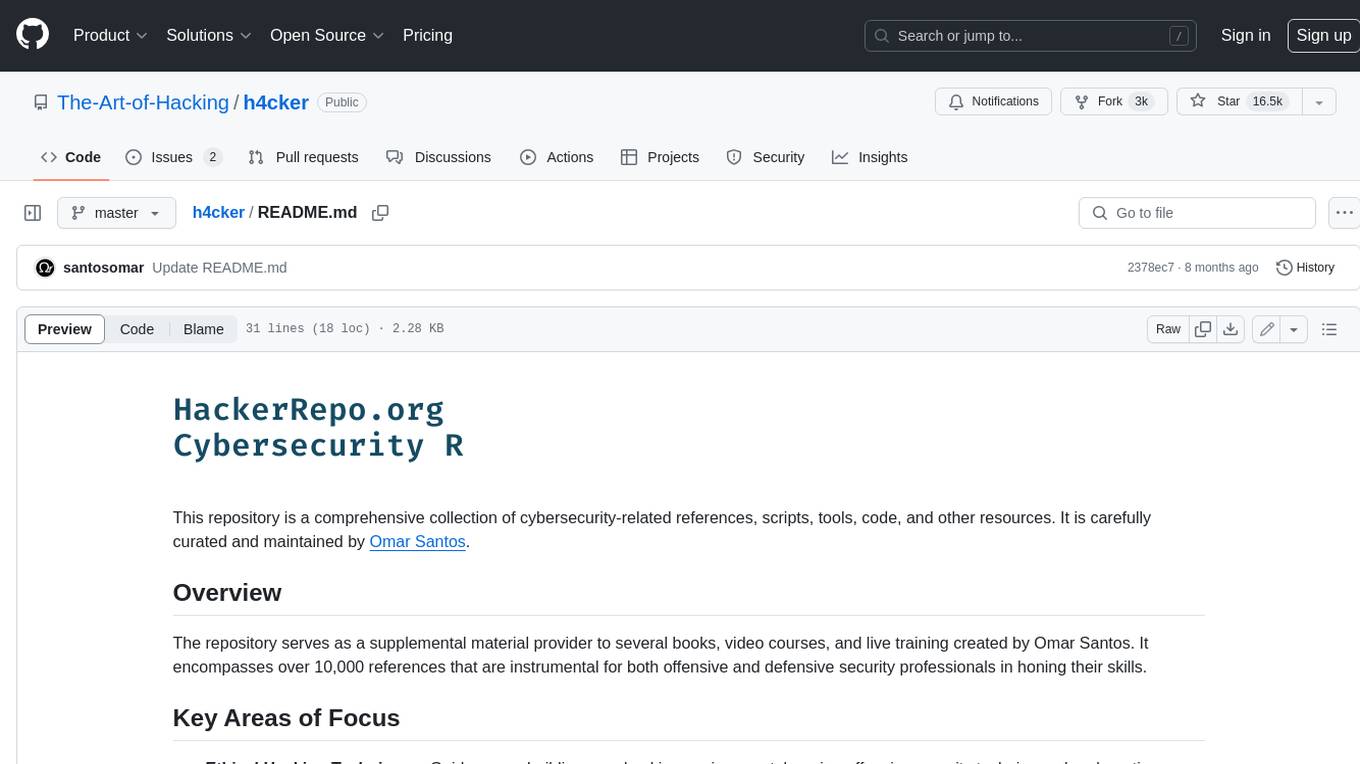
h4cker
This repository is a comprehensive collection of cybersecurity-related references, scripts, tools, code, and other resources. It is carefully curated and maintained by Omar Santos. The repository serves as a supplemental material provider to several books, video courses, and live training created by Omar Santos. It encompasses over 10,000 references that are instrumental for both offensive and defensive security professionals in honing their skills.
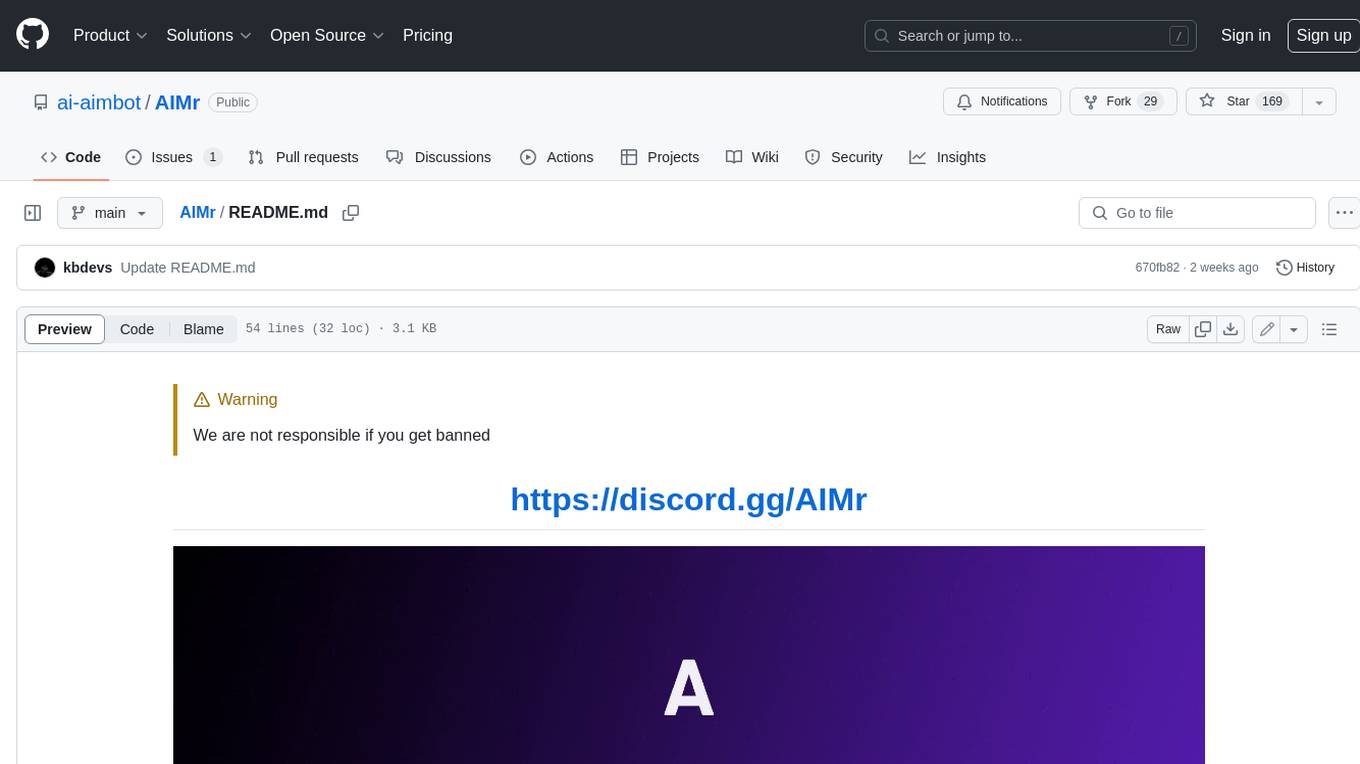
AIMr
AIMr is an AI aimbot tool written in Python that leverages modern technologies to achieve an undetected system with a pleasing appearance. It works on any game that uses human-shaped models. To optimize its performance, users should build OpenCV with CUDA. For Valorant, additional perks in the Discord and an Arduino Leonardo R3 are required.
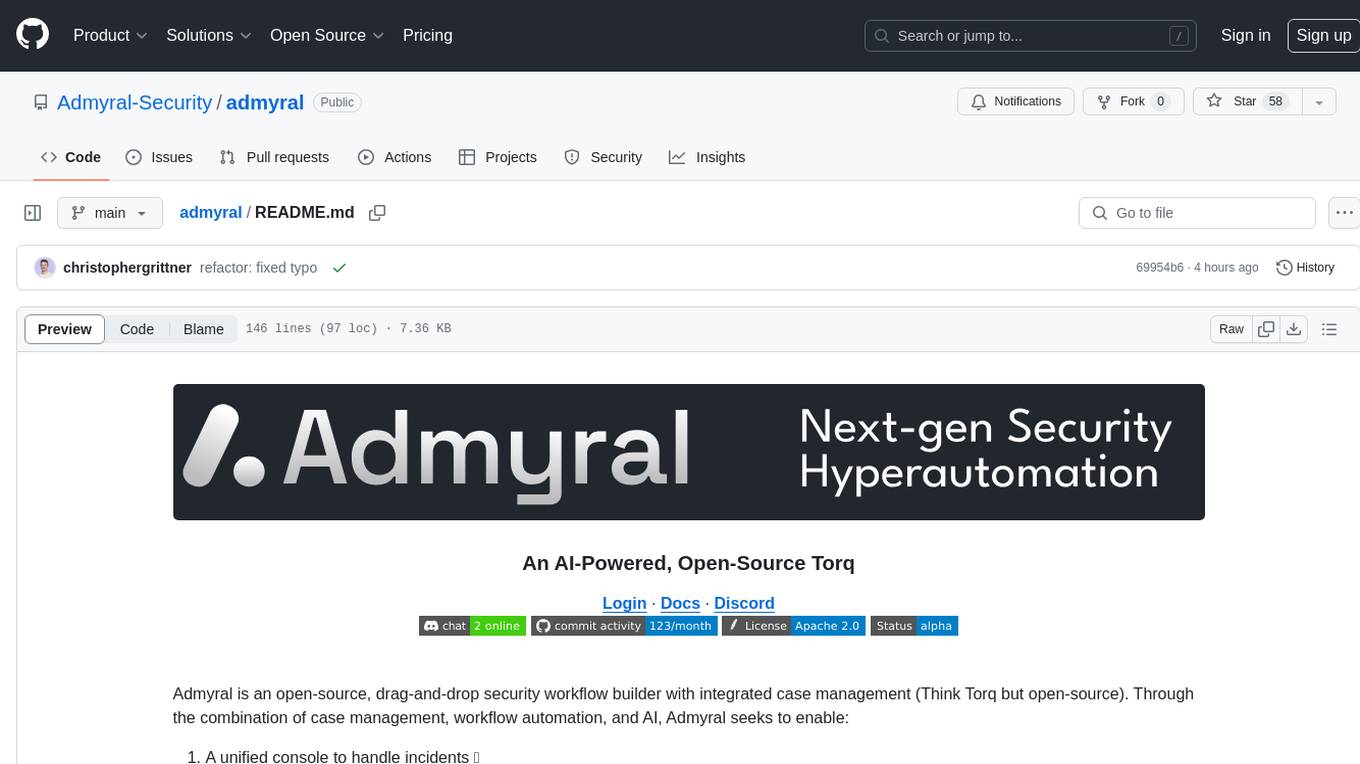
admyral
Admyral is an open-source Cybersecurity Automation & Investigation Assistant that provides a unified console for investigations and incident handling, workflow automation creation, automatic alert investigation, and next step suggestions for analysts. It aims to tackle alert fatigue and automate security workflows effectively by offering features like workflow actions, AI actions, case management, alert handling, and more. Admyral combines security automation and case management to streamline incident response processes and improve overall security posture. The tool is open-source, transparent, and community-driven, allowing users to self-host, contribute, and collaborate on integrations and features.



